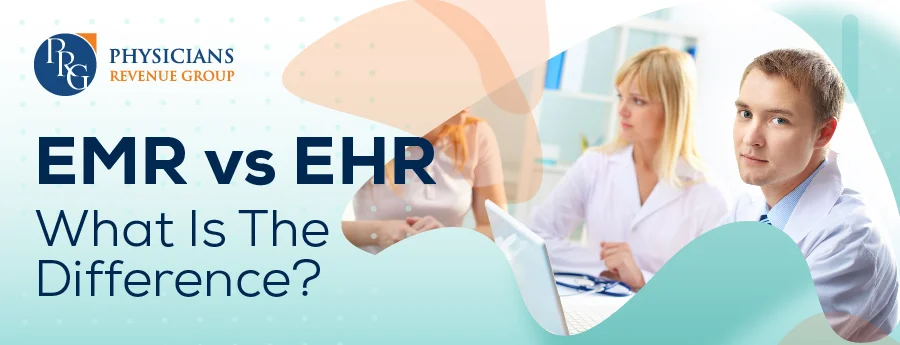
Email: info@prgmd.com | Call: +1 (630) 242-6474
Business hours: 9:00 to 5:00 | Monday to Friday
Email: info@prgmd.com | Call: +1 (630) 242-6474
Business hours: 9:00 to 5:00 | Monday to Friday

Table of Contents
ToggleThere are plenty of acronyms that are in use inside the healthcare industry. EHR and EMR are two standard terms that can be used alternatively. When it comes to a debate on EMR vs EHR, both are pretty similar; however, they have different meanings. Furthermore, EMR is an acronym for ‘Electronic Medical Records,’ while EHR is an acronym for ‘Electronic Health Records’. EHRs have a deeper and broader scope in comparison to an EMR.
Here we will discuss the major differences, the concept of EMR and EHR in medical billing services, and the role that EHR vs EMR systems play in record keeping for the healthcare industry.
EHR (Electronic Health Records)
EHRs offer a patient’s medical history, which is maintained electronically through multiple providers. EHRs contain demographic information, allergies, medications, immunizations, lab results, visits, and radiology reports. The EHRs might also include billing information, along with insurance information.
Did You Know?
EHR platforms are interesting, as this system will alert you if you prescribe medications that can interact with something your patients are already taking.
The significant difference between EHRs and EMRs is that multiple providers can maintain the EHRs; however, the EMRs can only be maintained by a single provider. What it means is that EHRs have more information compared to EMRs. Most providers use EMRs for treatment and diagnosis.
Another key difference is that the EHR systems are designed to be interoperable, while EMRs are not. The meaning of interoperability means that different systems can use and share data. This functionality is essential as it enables providers to access a patient’s complete medical information, even when a patient sees multiple providers. EHRs facilitate a patient’s information to move with them to labs, imaging centers, specialists, pharmacies, and emergency rooms – both locally and nationally.
When a medical practice has access to an EHR system, it means they are using an interoperable platform that can connect with all points of patient care. EHRs boost revenue, in addition to the quality of patient care. All of this in addition to offering a comprehensive patient experience. On the other hand, EMRs can only achieve the former. While the EMR systems are an improvement in comparison to paper patient charts, these can only address the gaps in paper records. The newer regulations from the Centers for Medicare and Medicaid Services have incentivized healthcare practices to adopt interoperable medical software, leading to an increase in the adoption of EHRs, and the subsequent reduction in the use of EMRs.
Bonus Tip
EHRs are a better choice for practitioners as compared to EMR systems. Due to technological advancements and government regulations, EMRs have been effectively replaced in favor of EHRs.
In comparison to paper records, the digital patient record system known as the EHR, can add information management tools for help providers offer enhanced care to patients. This is done by better organization, interpreting, and reacting to data.
Moreover, the EHR systems can offer clinical alerts and reminders while connecting experts for healthcare decision support. In theory, the more interactive an EHR system will be, the more it prompts the user to provide additional information. Such instances not only help collect more data but also enhance completeness. EHRs are the future of the healthcare industry as these offer the critical data that helps make informed decisions. Additionally, EHRs also help in care coordination between multiple providers.
Furthermore, the EHR system focuses on a patient’s overall and total health. The EHR software is designed to expand the scope beyond organizations that initially compile and collect the information. EHR software is built to share data with other concerned healthcare providers, including laboratories and specialists. What’s more, EHRs contain information from all clinicians involved in a patient’s care.
The actual scope of EHR is quite broad, as the information from an EHR system moves along with the patients to the hospitals, specialists, nursing homes, or even across the USA. EHRs can be accessed by all people who are involved in a patient’s care, which also includes the patient themselves.
EHR is the future of billing services and operations in healthcare as it offers critical data which assist in coordinating patient care between all providers in a healthcare ecosystem. EMR and EHRs are commonly used terms. However, the EHRs are referenced more frequently. This is due to CMS’s and the ONC’s preference of the term-EHR.
Share:
Categories
Recently Added

What is an ABN in medical billing?

What does a Clearinghouse do During Claims Submission?

What is EOR in Medical Billing?
We Would Love to Assist You!
We treat your data confidentially and don’t share any information with a third party.